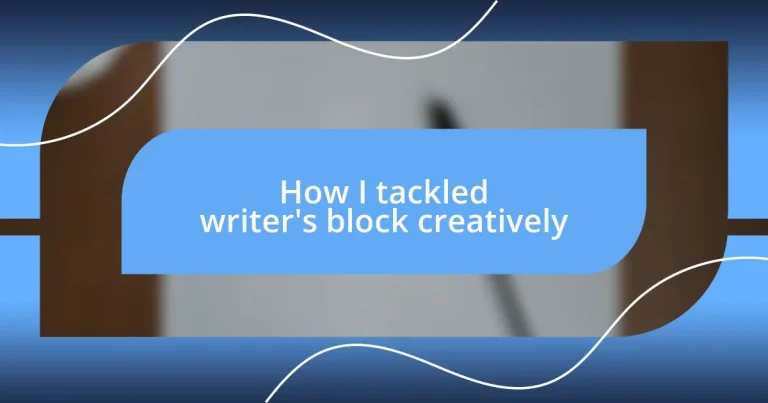Key takeaways:
- Understanding and addressing personal triggers, such as clutter or external pressures, can help overcome writer’s block.
- Engaging in creative exercises like free writing and utilizing prompts can stimulate inspiration and unlock new ideas.
- Regularly reflecting on progress and making adjustments based on past experiences fosters growth and improvement in writing skills.
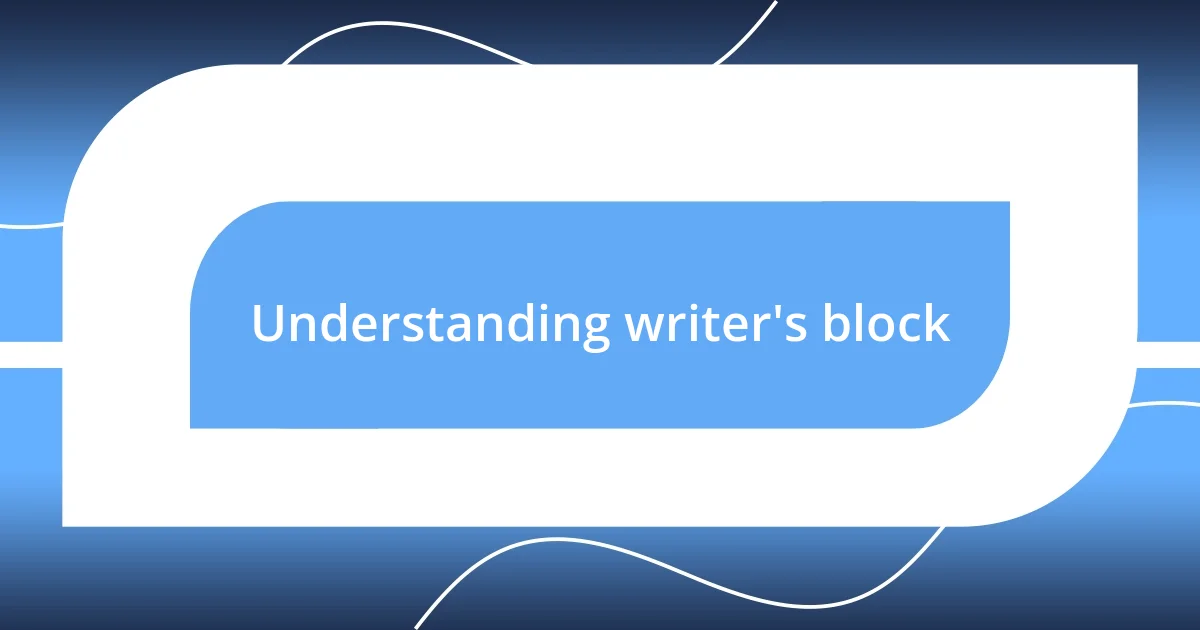
Understanding writer’s block
Writer’s block can feel like an insurmountable wall rising directly in front of you. I remember when I faced a long stretch of pure frustration, staring at a blank screen for hours. It often made me question—was it really a lack of inspiration, or something deeper holding me back?
Understanding the layers beneath writer’s block is crucial. For me, it wasn’t just that I couldn’t find the right words; the pressure to be perfect often smothered my creativity. Sometimes, I think about how societal expectations contribute to this struggle—how often do we feel compelled to produce genius work without the messy process of trial and error?
I’ve found that recognizing the emotional weight of writer’s block helps in overcoming it. One rainy afternoon, I harnessed that feeling of frustration and channeled it into a passionate rant in my journal. It turned out the very act of exploring my emotions unlocked a floodgate of ideas. Isn’t it fascinating how confronting what’s holding us back can lead to breakthroughs we never anticipated?
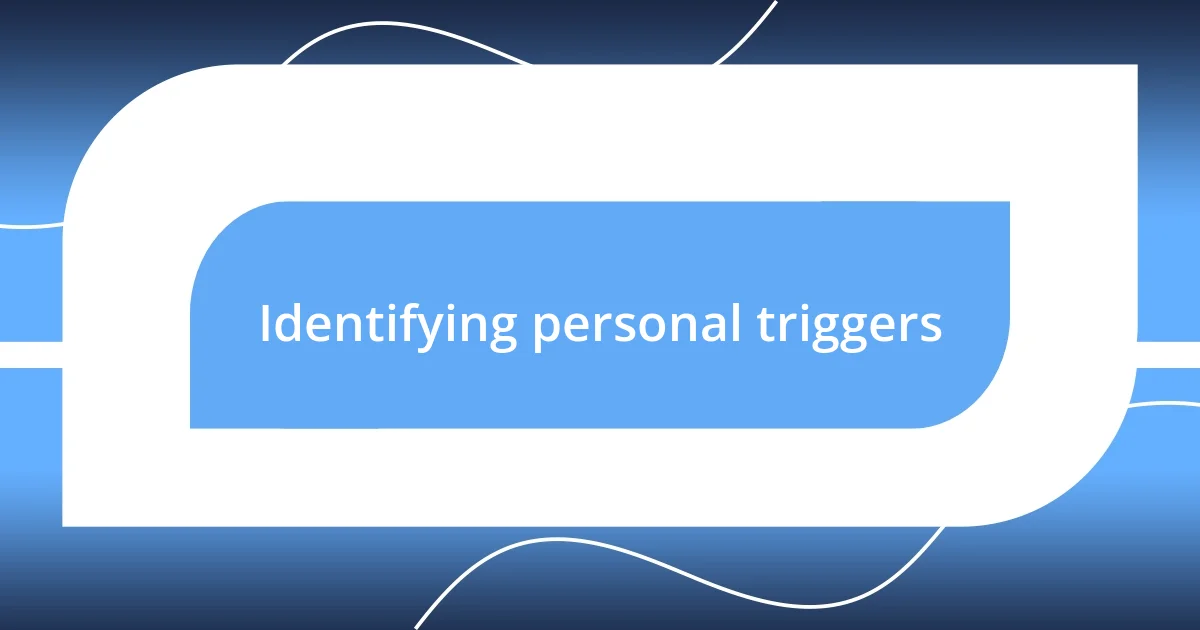
Identifying personal triggers
Identifying personal triggers can be a pivotal step in overcoming writer’s block. For me, it was essential to pinpoint what specifically caused my creative shutdowns. I often noticed that feelings of self-doubt or stress from external obligations would sneak into my writing time. One evening, as I sifted through old journals, I found a pattern: any time I felt overwhelmed by life’s demands, my pen would refuse to cooperate.
Reflecting on these triggers allowed me to develop a sort of “emotional inventory.” I remember a time when I felt particularly uninspired, and it dawned on me that my surroundings—cluttered space, chaotic thoughts—played a massive role. When I cleared my desk and created a calming environment, it was as if my creativity returned like an old friend. Have you ever considered how your physical space impacts your mental state?
To further understand the connection between triggers and writer’s block, I started keeping a simple log. Whenever I hit a wall, I’d jot down the circumstances surrounding it—time of day, environmental factors, and my emotional state. Over time, it became clearer how these elements affected my flow. This practice promoted not just awareness but also a sense of control, allowing me to address the root causes rather than just the symptoms.
| Personal Trigger | Emotional Impact |
|---|---|
| Cluttered workspace | Increased anxiety and distraction |
| Perfectionism | Feelings of self-doubt and inadequacy |
| External pressures | Overwhelm leading to creative paralysis |
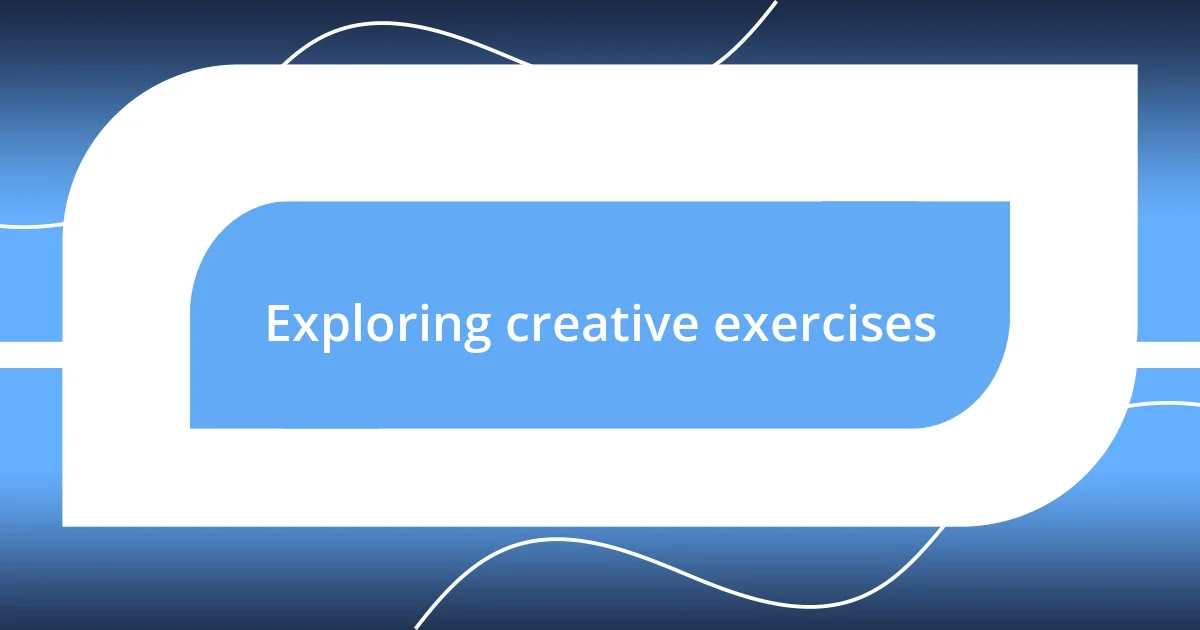
Exploring creative exercises
Exploring creative exercises can be a game-changer when facing writer’s block. One of my go-to techniques is free writing, where I set a timer for ten minutes and let my thoughts spill onto the page without filtering or editing. I recall a time when I felt trapped in my head, juggling ideas that just wouldn’t materialize. After indulging in some free writing, I discovered unexpected themes and images that sparked a story I hadn’t even considered before.
Here are some engaging exercises to consider:
- Free Association: Write down a word related to your project and let your mind wander, jotting down everything that comes to you.
- Picture Prompts: Find an intriguing image and write a short scene inspired by it. Visual stimulation often unblocks creativity.
- Word Lists: Create lists of nouns, verbs, or adjectives, then challenge yourself to use them in a story or poem.
- Role Reversal: Write from the perspective of a character you usually wouldn’t align with. It’s a fun way to explore new angles and depths.
- Soundtrack Inspiration: Craft a playlist that resonates with the mood of what you’re trying to write and let the music guide your thoughts.
It’s wonderful how these exercises can reshape your creative mindset. I remember trying the picture prompt, and as I gazed at a stunning sunset photo, the hues inspired a heartfelt narrative about change and loss. The key is to let go and view these exercises as playful rather than obligatory, infusing a sense of freedom into your writing practice.
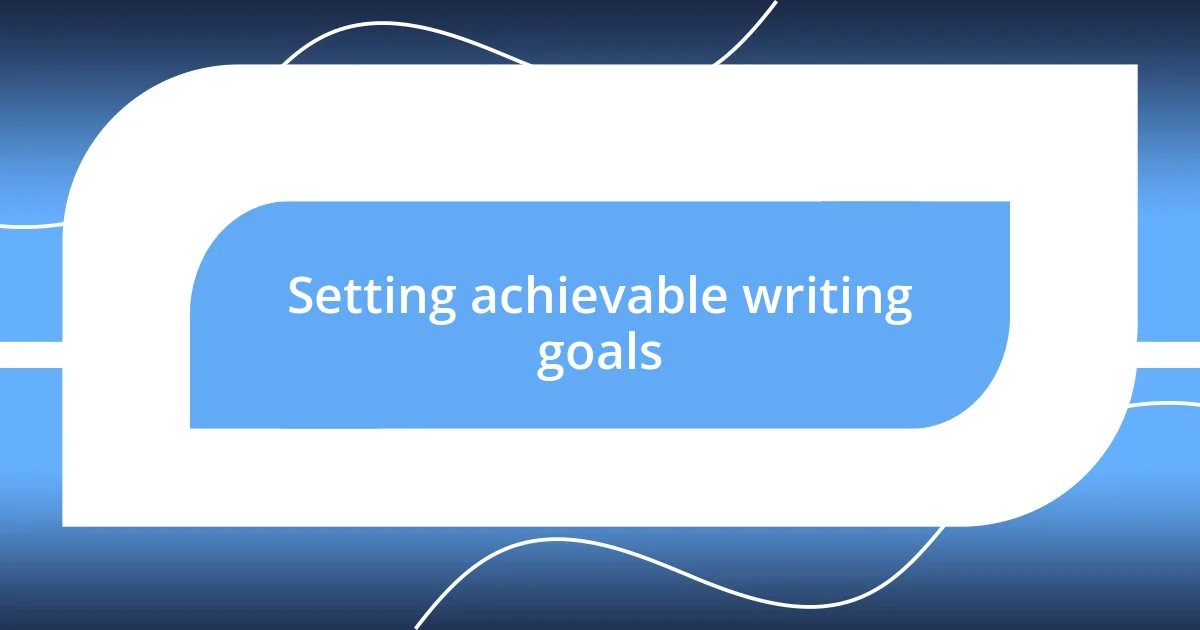
Setting achievable writing goals
Setting achievable writing goals can significantly enhance your creative process. I’ve found that breaking down larger projects into smaller, manageable tasks is incredibly effective. For instance, instead of aiming to finish a whole chapter in one sitting, I focus on writing just a single page or even a paragraph. This approach reduces overwhelm and helps me build momentum gradually. Have you ever felt lost staring at an empty page, unsure of where to begin? I know that feeling all too well.
Another key aspect is to set a realistic time frame for each writing session. I remember a period when I’d dedicate two hours straight to writing, but it often led to disappointment when I couldn’t produce anything substantial. Now, I allocate smaller time slots—say, 30 minutes in the morning—where I can write without pressure. This not only stimulates productivity but allows me the freedom to enjoy the process without the weight of expectation.
Additionally, I’ll reward myself for completing each goal, no matter how small. When I hit my target, I treat myself to a favorite snack or a short walk outside. It’s these little celebrations that make my writing journey feel less like a chore and more like a fulfilling adventure. What about you? Have you thought about how small rewards could create a positive feedback loop in your writing?
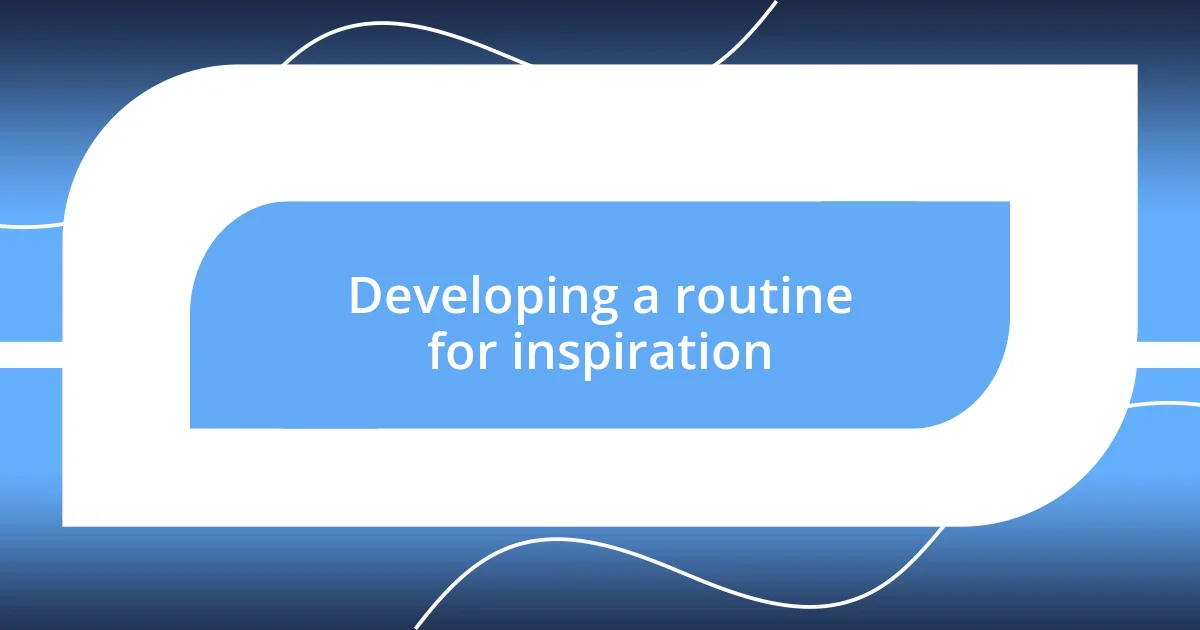
Developing a routine for inspiration
Establishing a routine that nurtures inspiration has been transformative for my writing process. I often start my mornings with a cup of herbal tea, allowing myself to reflect on the day ahead. This quiet time not only sets a peaceful tone but also opens my mind, making me more receptive to ideas. Have you ever noticed how a calm morning can spark unexpected creativity? I’ve found that the stillness can lead to those “aha” moments where everything just clicks.
Incorporating movement into my routine has also played a crucial role. I remember a particularly stagnant week when I felt mentally clouded, so I began taking short walks in nature. The fresh air and changing scenery worked wonders for my creativity; it was as if each step shook loose the stubborn ideas stuck in my mind. What physical routines help you unwind and clear your head? For me, even a simple movement like stretching can invigorate my thoughts and allow new ideas to flow.
Additionally, setting specific times for creative exploration can be incredibly empowering. I regularly dedicate time slots throughout my week where writing is the only focus, free from distractions. During one of these sessions, I started experimenting with poetry—a genre I didn’t initially feel confident in. It felt liberating to step out of my comfort zone, and eventually, I discovered a passion for the rhythm of words. Could a set routine of creative exploration help you uncover hidden talents? I truly believe that committing to regular practice creates a supportive environment for inspiration to thrive.
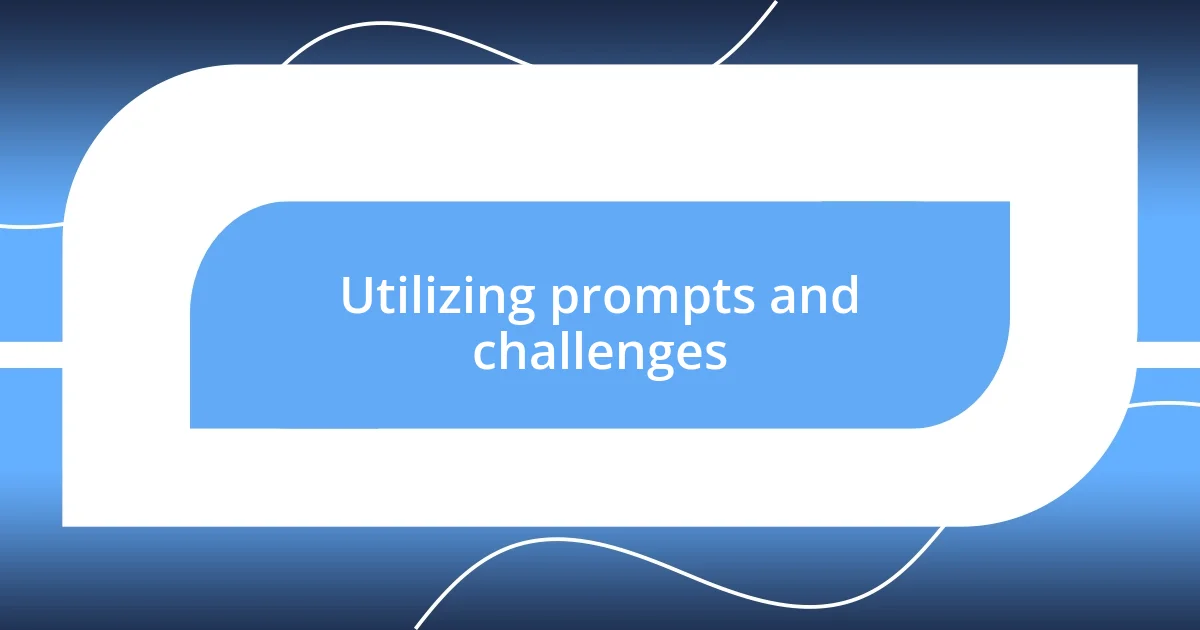
Utilizing prompts and challenges
Utilizing writing prompts and challenges can act as an exciting spark when I feel my creativity waning. I often turn to online platforms that offer daily prompts, and it amazes me how a single phrase can lead to a completely unexpected story. For example, one day, the prompt was “a room filled with secrets.” Initially, it felt daunting, but as I began writing, characters emerged, and the plot unfolded effortlessly, showing me the magic that can come from a small push.
I’ve also participated in writing challenges, like NaNoWriMo, where the goal is to write 50,000 words in a month. Admittedly, the pressure can be overwhelming, but there’s something exhilarating about racing against the clock. During my first attempt, I was surprised by how quickly my ideas flowed when I let go of perfectionism and focused on sheer quantity instead. Have you ever felt liberated when simply letting your thoughts spill onto the page, regardless of quality? I certainly have, and that experience taught me the value of trust in my creative instincts.
Another fun exercise I engage in is using one-word prompts to ignite a spontaneous writing session. Just last week, the word was “breeze.” I allowed myself to free-write for ten minutes without overthinking, and what emerged was a lovely scene depicting a summer afternoon that brought me right back to a cherished childhood memory. The sheer simplicity of it reminded me that sometimes, all it takes is a nudge to dive deep into the reservoir of our own experiences. Could you give a one-word prompt a try? You might uncover hidden gems and emotions waiting to surface.
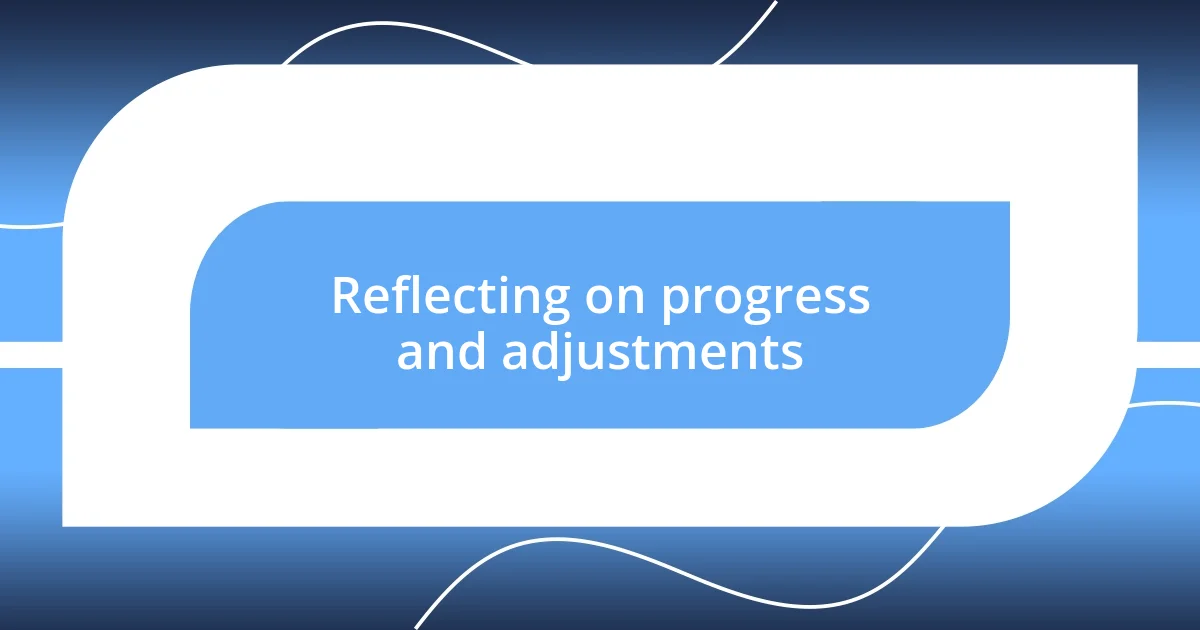
Reflecting on progress and adjustments
Reflecting on my progress has always been a revealing process. I remember a time when I felt trapped in my writing, questioning my skills and direction. One day, I sat down with my journal and revisited my earlier drafts. As I read, I was taken aback to see how far I’d come—not just in technique but in the depth of my ideas. Isn’t it fascinating how looking back can illuminate the path forward?
Adjusting my approach based on these reflections has proven invaluable. For instance, after noticing that I struggled with plot development, I tried mapping out my stories more thoroughly. I dedicated a weekend to storyboarding, which felt both daunting and necessary. At the end of that weekend, I had a clear vision that breathed life into my narratives. How do you ensure that your progress leads you to meaningful adjustments in your writing?
As I continue to reflect on my journey, I’ve discovered the importance of flexibility. I’ve learned to ask myself, “What worked? What didn’t?” This honest evaluation allows me to try new methods without fear of failure. One creative experiment involved journaling my feelings before diving into a writing session, which often helps me uncover themes I hadn’t consciously identified. Have you ever found that your emotions reveal hidden threads in your writing? It’s these little adjustments that can transform a challenge into a new avenue for growth.












